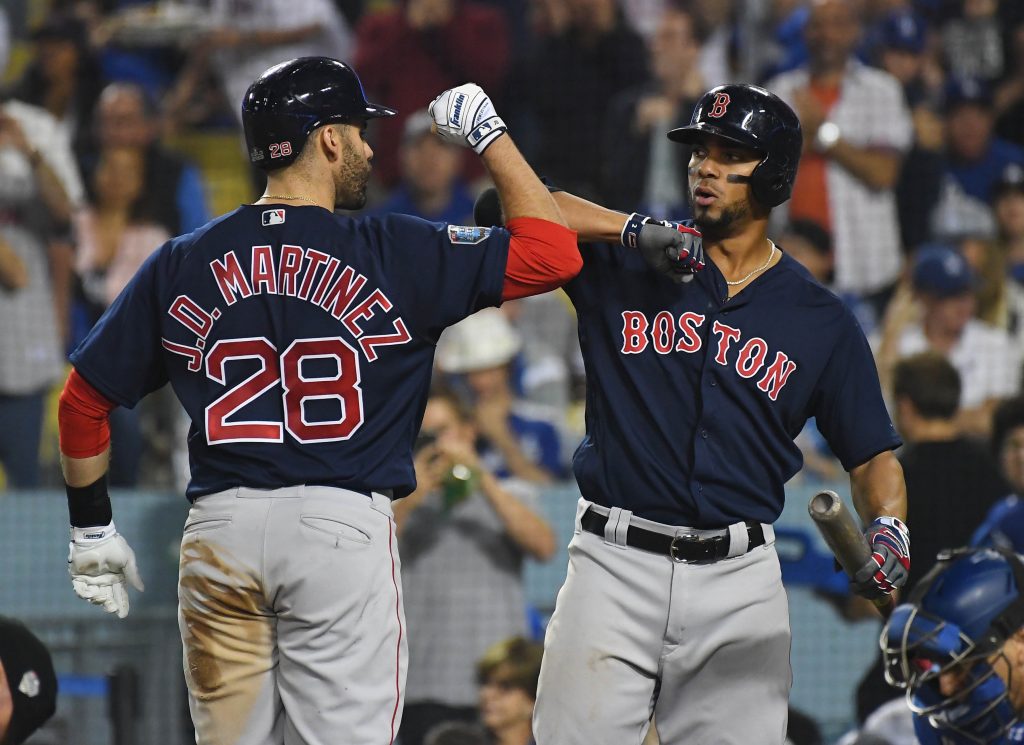
As the calendar flipped from June to July, the Red Sox were sitting on a record of 43-33 and holding onto an American League Wild Card spot. However, this has been a disastrous month for them, in which they went 8-19. Now their record is 51-52, placing them 3 1/2 games behind the Rays for the final playoff spot, with three teams in between.
Due to that slide, there’s been recent chatter about the club giving consideration to trading impending free agents such as J.D. Martinez, Christian Vazquez and Nathan Eovaldi. With less than 48 hours remaining until the trade deadline, Alex Speier of the Boston Globe reports that financial considerations will be a factor in discussions between the Red Sox and other teams. According to Speier, the front office will think about ducking under the luxury tax but will not be required to do so. It’s even possible that they could take on additional salary commitments if it meant adding more prospect talent to the system.
The Red Sox have paid the luxury tax in the past but have been trying to run lower payrolls in recent years. Most famously, or infamously, Boston traded away Mookie Betts and David Price as a means of shedding salary. However, they did some aggressive spending this past winter, most notably the six-year, $140MM contract given to Trevor Story, putting them back over the CBT line for this year. Jason Martinez of Roster Resource estimates their current CBT number is just over $238MM, placing them $8MM beyond the lowest $230MM threshold. (Speier says they are about $7MM over the line.) Since luxury tax status isn’t determined until the offseason, the Sox could still lower their CBT number and avoid all penalties.
Trading Martinez alone would go most of the way, or perhaps all of the way, to getting Boston back under the line. He’s making a salary of just over $19MM this year, but a player’s contribution to the luxury tax calculation is based on the average annual value of the player’s entire contract. Since his deal was for $110MM over five years, it comes with an AAV and CBT hit of $22MM this year. At the time of the trade deadline, there will be just over a third of the season remaining, meaning the Red Sox can chop about $7.5MM off of their luxury tax calculation if they find another team to take on the entirety of the remainder of the Martinez contract. Eovaldi and Vazquez have lower AAVs of $17MM and $7MM, respectively. That means an Eovaldi trade could subtract about $5.8MM from the ledger and about $2.4MM in the case of Vazquez. If the Boston brass decide they need to get under the line, it’s certainly something they can achieve by moving some combination of this trio.
This approach will appeal to certain teams but not others, of course. Teams with lower payrolls could potentially prefer to pay a higher prospect cost in order to take on less salary, but there are also teams in the opposite camp. For example, the Mets are reportedly looking to buy at the deadline but would rather take on money than give up prospects.
However, the Red Sox are also apparently willing to go in another direction, giving thought to using some financial heft to absorb some salary as a means of bolstering their system. The Red Sox have a large number of contracts coming off the books this year, in addition to those already mentioned. Enrique Hernandez, Michael Wacha, Rich Hill, Matt Strahm and Kevin Plawecki are set to reach the open market as well. Furthermore, option decisions could subtract even more money from the 2023 payroll, most notably that owed to Xander Bogaerts, who is widely expected to opt out of his contract in a few months. That gives the Red Sox a CBT number of just under $108MM for next season, according to Jason Martinez. That doesn’t include raises for arbitration eligible players, including Rafael Devers, but it does include Bogaerts. If Bogaerts is indeed subtracted from the ledger, the arbitration players won’t raise that number by much. If Boston is willing to inflate their luxury tax payment this year, they could be in good position to “reset” their CBT status next year. (There are escalating penalties for paying the luxury tax in consecutive seasons, meaning that even the teams with the highest payrolls often find ways to periodically avoid the tax in order to avoid such a scenario.)
All in all, the Red Sox are shaping up to be one of the most interesting teams to watch as we approach the trade deadline, which is at 5pm on August 2. Since they are on a precipice between the contenders and the rebuilders, they might try to walk a line between the two customary “buying” and “selling” strategies. One thing that seems to be off the table, however, is a full-scale rebuild that sees the team strip things down in a serious way. Bogaerts recently said that he was told that he will not be traded, and now Devers has said the same, per Rob Bradford of WEEI. Bradford also relays, however, that there have been no recent contract talks with Bogaerts and the club, meaning it’s still quite possible he opts out at the end of the year, with the club sure to extend him a qualifying offer at that time. Speier also relays word from Vazquez, who also has not had any recent talks about a new contract. Though there are still many possible permutations, it seems that Boston’s roster is headed for a significant shakeup, either this week or in the offseason or both.
Credit : Source link






